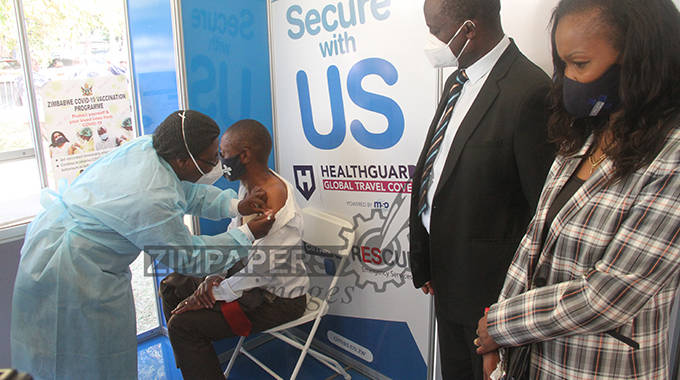EDITORIAL COMMENT: Vaccination drive must be accelerated

The arrival of two million doses of Sinovac vaccine yesterday should mean that the national vaccination programme moves into overdrive very quickly with the vaccination rates doubled or tripled to 50 000 jabs a day.
Three more monthly shipments, each of 1,5 million doses, are expected by the end of September so the supply chain, thanks to the Chinese suppliers, is now secure and the Zimbabwean medical authorities must now work out the logistics and assign enough staff to the vaccination teams.
About 1,5 million doses a month means around 50 000 jabs a day, although the actual figure will be slightly less as there is always a small amount of waste.
Already the 500 000 doses of Sinopharm that arrived almost two weeks ago are being distributed and people are being jabbed from that delivery.
Now this new and very large Sinovac order needs to be moved to the provinces, districts and teams very quickly.
The use of two vaccines is only a modest logistical hassle, since both doses have to be of the same type.
But this was not presenting a problem at Parirenyatwa this week when second doses were Sinovac, from that first large commercial shipment, and first doses were of Sinopharm, presumably from the order that arrived near the end of last month.
The difference between the two vaccines is almost trivial. They are very similar dead vaccines and the World Health Organisation has approved both. So people queuing for a jab are not going to be expressing any preference and so the only factor is the logistical one of ensuring the second jab is the same type as the first.
Zimbabwe is gripped by a third wave of infection. Generally speaking you need both jabs to achieve the high level of protection offered by vaccination.
So as we accelerate the programme we are going to have a large group of people with the first, but not the second. Presumably there is some protection from just one jab, but the main benefit of the accelerated programme will start being seen four weeks later when all those with a first jab start queuing up for the second.
There is the curiosity that with rather low numbers of first jabs given for much of last month, there will be only modest numbers of second jabs this month.
If we use the available teams to the full, now with the new supplies of vaccine, we will have a large bubble of first jabs for much of this month, and that will lead to a modest number of first jabs and a lot of second jabs next month.
This seems to be a self-correcting problem.
The Ministry of Health and Child Care may well face staff constraints as it expands the number of teams, but they have done it before with infant immunisation.
But in any case the professional staff can be spread a little more thinly.
Vaccination involves three people: a nurse takes down details and checks if there are any underlying medical conditions, most of which do not matter but someone has to know what does matter and what does not matter.
So it seems that a nurse is needed on that position. The second member of the team has the vaccines and gives the injection.
But the third person just fills in the vaccination certificate with a few basic details of the vaccinated person and a couple of details of the vaccine type and batch.
This does not really require a medical professional.
An honest clerk with clear handwriting could do just as well, allowing the third nurse to be assigned to a new team, or perhaps even better assigned to help the first nurse deal with the people queuing since that is where most delays are likely.
Equipping a team with two ledger-type books would not be a problem.
There are many other ways the logistics could be speeded up, and the Ministry of Health and Child Care has the expertise.
Now that the Ministry of Finance and Economic Development has streamlined the order process, the Health Ministry has the resources to push the programme harder.
It is interesting that the two top officials at the airport when batches of vaccine from commercial orders arrive are Finance Minister Prof Mthuli Ncube and Deputy Health Minister John Mangwiro, the payer and the user.
The hesitation shown by some over vaccination, and the downright anti-vaccination hold-outs, are not a major factor at the moment.
People are queuing for vaccination and many have been told to come back later.
Some centres have now embraced a simple booking system, where you call in and are given a number and a date, and then you come back on that date for your jab. This needs to be extended.
But the point is that there is no need at the moment to try and persuade difficult people.
The queues of those who are eager for vaccination can keep the teams busy for some time.
There are groups and places where a high priority is required to get the vaccination process pushed forward.
The Government has listed the border towns, staff at marketing depots, the large farmer markets, and the hotspots.
So of course the logistical experts in the Health Ministry need to adjust quantities and staff assignments to make sure these priorities are met.
But now that the supply line has been upgraded, the important point is that we must be using the vaccines as quickly as we can and that means we need to jab more people each day. The logistical details include who is jabbed and where.








Comments